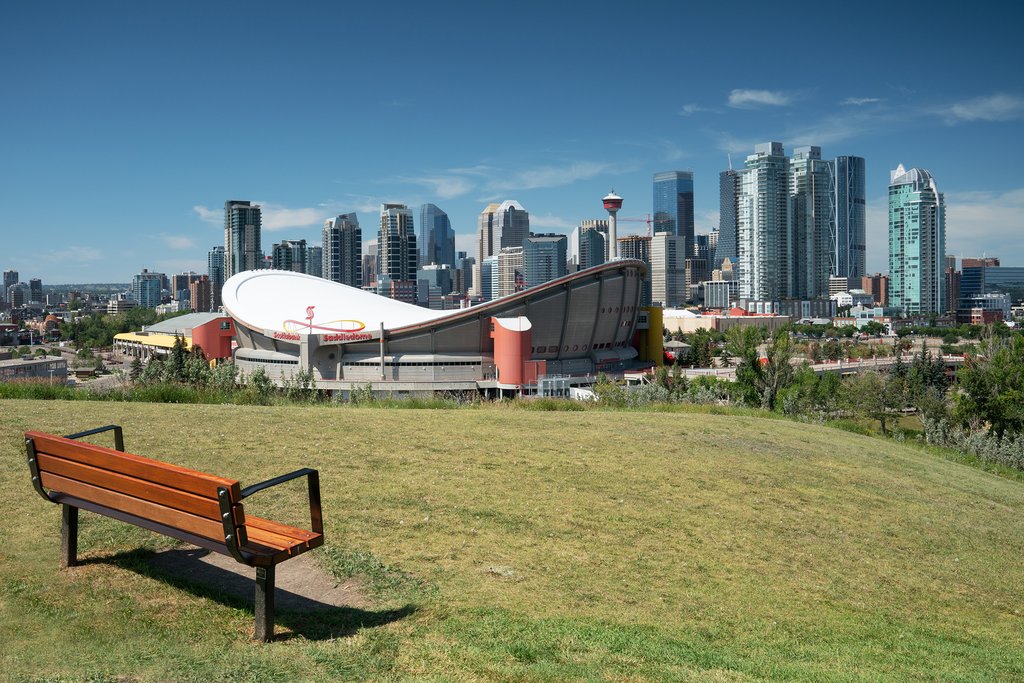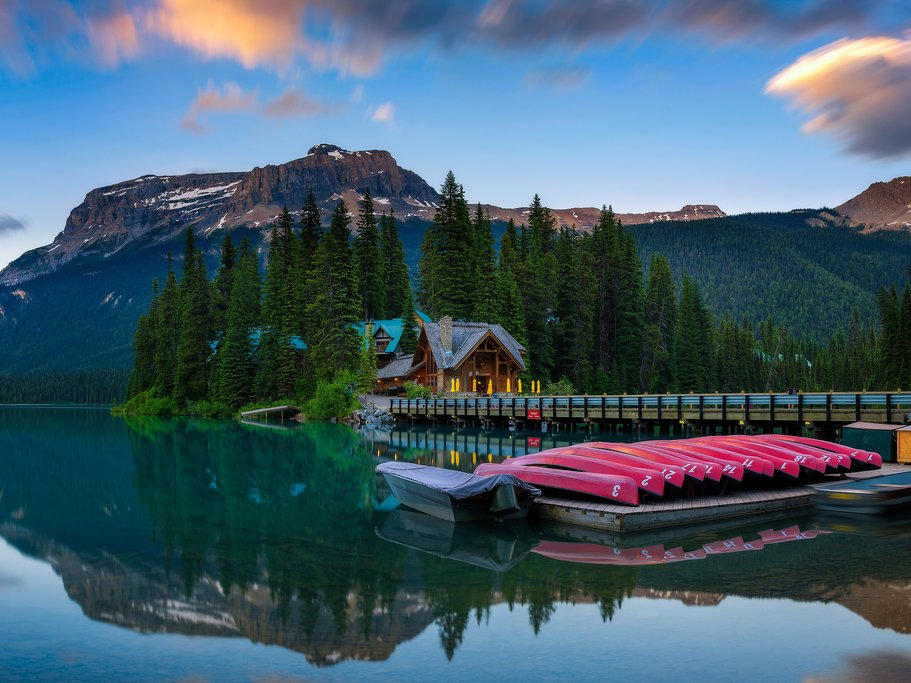Highlights
- Combine British Columbia's famous wine region with its most dramatic peaks
- Enjoy and stock up at local wineries, cellars, fruit orchards, and farms
- Take in the highlights of the Trans-Canada Highway from Revelstoke to Banff
- Explore Kananaskis Country, home to spectacular treks without the crowds
Brief Itinerary
| Day | Highlights | Overnight |
|---|---|---|
| Day 1 | Arrive in Vancouver | Vancouver |
| Day 2 | Vancouver to Osoyoos (4 h 30 min) | Osoyoos |
| Day 3 | Osoyoos to Kelowna (1 h 45 min) | Kelowna |
| Day 4 | Wine Tasting in the Okanagan Valley | Kelowna |
| Day 5 | Kelowna to Revelstoke (2 h 30 min) | Revelstoke |
| Day 6 | Revelstoke to Yoho National Park (2 h 30 min) | Field |
| Day 7 | Explore Yoho National Park | Field |
| Day 8 | Yoho National Park to Canmore (1 h 15 min) | Canmore |
| Day 9 | Day Hikes in Kananaskis Country | Canmore |
| Day 10 | Canmore to Calgary, Depart (1 h 30 min) |
Detailed Itinerary
Day 1: Arrive in Vancouver

Fringed by the Pacific Ocean and backed by the coastal mountains, Vancouver is one of the world's most livable cities with some of North America's best cuisine, rich indigenous heritage, and opportunities for outdoor activities.
It takes around 30 minutes to get from the airport to downtown. The city center and surrounding neighborhoods are within easy walking or biking distance and all the main attractions are a short distance away. To get your bearings, start with a stroll along the seawall from English Bay to False Creek before wandering the historical, cobbled streets of Gastown and Chinatown.
With over 60 different cultures, pick from a variety of international restaurants serving anything from Asian cuisine to seasonal farm-to-table dishes. For dinner, choose from a selection of top-notch eateries—from downtown and the West End to the North Shore and Kitsilano. Keep in mind, Vancouverites love eating out any day of the week so be sure to make a reservation if it's a popular restaurant.
Day 2: Vancouver to Osoyoos (4 h 30 min)

Leaving Vancouver, the scenery transforms from lush coat mountain scenery to the dry interior desert of British Columbia. For a taste of gold rush history, visit Princeton and District Pioneer Museum to see pioneer artifacts from Granite City, Chinese and Salish artifacts, and a considerable fossil display.
At E.C. Manning Provincial Park, stretch your legs and hike through alpine lakes and meadows. If you have three hours to spare, check out the Heather Trail (12 miles / 20 km) to Three Brothers Mountain for great views; from July to mid-August, you'll see a carpet of yellow, orange, and white wildflowers.
Continuing on Highway 3 toward Osoyoos, you'll pass through the beautiful Similkameen Valley where you'll find a number of smaller, lesser-known wineries—like Forbidden Fruit or Orofino in Cawston—that are well worth a stop. Also, check out the historic grist mill in Keremeos and grab some fresh-picked fruit from any number of roadside stands along the way.
Driving time (Vancouver to Osoyoos): 4 hours, 30 minutes (247 miles / 398 km)
Day 3: Osoyoos to Kelowna (1 h 45 min)

Spend a relaxing morning in Osoyoos or hit the road early to visit the many wineries en route between Osoyoos and Kelowna. Near Penticton, take a short detour northwest to the Naramata Bench. This short pastoral drive is famous for its small-scale wineries and commanding views of Okanagan Lake. As daylight fades in Kelowna, check out Brower Hatcher's Bear sculpture (illuminated at night) before partaking in a pre-dinner libation at one of the city's great brewpubs, like Red Bird Brewing or Vice & Virtue Brewing. For dinner, consider RauDZ Regional Table, a relaxed, downtown bistro with a hefty list of Okanagan wines.
Day 4: Wine Tasting in the Okanagan Valley

Spend the day visiting the wineries of the Okanagan Valley. The best way to explore is with the flexibility of your own vehicle if you have a sober driver or willing to share responsibilities, but you can also join a local wine tasting tour which includes transport. To make the best use of your time (and reduce driving), focus on one micro-region or set of wineries.
Chat with a local specialist who can help organize your trip.
Day 5: Kelowna to Revelstoke (2 h 30 min)

Spend the morning exploring downtown Kelowna before hitting the road for the short drive to Vernon. For foodies, there's a number of great cafes, restaurants, and farm-to-table spots to check out along the way—apart from the countless wineries. As you drive north through Lake Country, you can follow the Scenic Sip Trail and sample award-winning wines from leading wineries en route to Vernon.
Leaving the Okanagan Valley behind, head north on Highway 97 to the snow-capped peaks of Revelstoke. Make a short detour to Sushwap Lake to grab lunch and go for a swim in Salmon Arm, the "Gem of the Shuswap". Here, you'll be out of the desert and surrounded by wooded hills, farms, and the Shuswap Lake-based provincial parks.
Arriving in Revelstoke, the town sits on the Columbia River tucked amid British Columbia's Selkirk and Monashee Mountains outside Mount Revelstoke National Park. An outdoor adventurist's (and photographer's) paradise, Revelstoke offers serious powder skiing in winter and an abundance of outdoor summer experiences. Check into your hotel and then see about getting familiar with your surroundings. For a bit of town history, visit the Revelstoke Museum followed by a stroll through town to see 60-some heritage buildings and public art.
Before sunset, drive the Meadows in the Sky Parkway, a 16-mile (26 km) stretch road that winds uphill to scenic viewpoints overlooking the valley. A number of great hiking trails begin from its summit. Alternatively, drive here in the morning (opens between 8-9 am) for your best chances of spotting wildlife and to avoid the crowds. Cap off the day with a satisfying meal at Woolsey Creek Bistro and linger on the patio.
Day 6: Revelstoke to Yoho National Park (2 h 30 min)

Follow the Trans-Canada Highway east through Golden to the town of Field in Yoho National Park. Get ready for a beautiful drive—today is all about the mountains as you wind your way through Mount Revelstoke and Glacier national parks. Don't hesitate to stop, en route, for various walks and hikes, especially at Giant Cedars Boardwalk. You'll also drive over Rogers Pass, one of British Columbia's famous mountain crossings where, in 1885, the Canadian Pacific Railway carved through the Selkirk Mountains and connected the country from coast to coast.
Passing through Golden, this town is famous for white-water rafting and sits at the confluence of the Columbia and Kicking Horse rivers and offers plenty of outdoor adventure for the active traveler.
Just before arriving in Field, take a short detour Emerald Lake, a beautiful turquoise lake where you'll also find Emerald Lake Lodge and a lakeside cafe. Explore the lake by rental canoe or simply relax and take in the beautiful surroundings. If time allows, you can also hike to Takakkaw Falls and bring a picnic to enjoy at the base of the falls.
Day 7: Explore Yoho National Park

Start the day early to cover Yoho's highlights as well as to avoid the throngs of travelers. Drive to Emerald Lake and allow 90 minutes to walk the 3-mile (5.2-km) Emerald Lake Loop. You'll have views of the jewel-hued waters encircled by spruce and firs and the snow-capped Rockies, including the iconic profile of Mount Burgess. Make sure to check out Natural Bridge on your way in or out.
Meanwhile, if it's serious hiking you're after, choose from one or two of over 250 miles (400 km) worth of trails. One of the best hikes in the Rockies is the Iceline Trail, a challenging 13-mile (21-km) roundtrip. It will take you the better part of the day (typically eight hours), but the views alone will supply you the fuel to keep going.
Then there's the wealth of trails that radiate out from picturesque Lake O'Hara with the longest only 4.7 miles (7.5 km). Take the 2-mile (3.2 km) Lake Oesa Trail to climb an elevation of 787 feet (240 m) to overlook the lake. If you're experienced, opt for one of five Alpine routes for a bit of everything: alpine meadows, glaciers, and wooded hillsides.
Note: Private vehicles are not permitted on the Lake O'Hara road. You must either reserve a spot on the Park's Canada shuttle bus (spots fill up months in advance) or walk to the lake (7 miles /11 km).
Day 8: Yoho National Park to Canmore (1 h 15 min)

Leaving Field, it's just over an hour's drive to Canmore through some more of the spectacular scenery of the Canadian Rockies. Canmore used to be a mining town but has seen significant growth as a back-up location to the busier (and more touristy) town of Banff. Depending on who you ask, Canmore and its surroundings are arguably more beautiful and you'll be closer to Calgary for your onward journey.
Driving time (Field to Canmore): 1 hour, 15 minutes (62 miles / 100 km)
Day 9: Day Hikes in Kananaskis Country

Kananaskis Country is a region south of Canmore that encompasses 10 provincial parks in the foothills of the Canadian Rockies. Overlooked by international visitors, this area is held dear by local residents given its lack of crowds, more pristine trails, and equally stunning vistas compared to Banff National Park.
From Canmore, follow the scenic Smith Dorrien Trail (gravel highway) into the heart of Smith-Dorrien Valley and make your way to the trailhead of your choosing. With several peaks over 10,000 ft (3050 m), there are numerous day hikes to choose from.
Day 10: Canmore to Calgary, Depart (1 h 30 min)

From Canmore, it's a short drive to Calgary's international airport. Be sure to leave ample time in case of traffic and to drop off your rental vehicle. En route look for signage leading you to the airport.
Driving time (Canmore to Calgary International Airport): 1 hour, 30 minutes (75 miles / 120 km)


